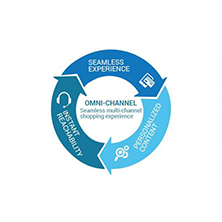It is no secret that almost every business today is navigating various stages of their digital transformation journey as either part of a strategy or for establishing a more controlled and streamlined business.
Technology, that was once a prerogative of the CIOs, has now become a mainstream concern for organizations. Looked upon as a game changer, not just marketing or operations, even business strategy is deeply linked to technology initiatives. Digital technologies have invaded the business environment, triggering significant changes in the way we work, act, learn, communicate, engage, collaborate, and do business.

Considering this shift, it appears that every organization is likely to reap the benefit of digitalization. The journey toward digital transformation entails harnessing its benefits – such as amplifying efficiency, boosting revenue from operations, cost reduction, improving customer engagement and productivity gains. However, like all other forms of business transformation, digital transformation should be guided by a clear road-map so that businesses can drive their most significant priorities and achieve maximum benefits.
So, we can say that enterprises are infusing digital innovation throughout the organization. In a world where customers expect a response within seconds, technology such as the Internet of Things, enterprise mobility, cloud computing and big data are changing the traditional business ecosystem in distinct ways. Digital interventions can improve collaboration with vendors, suppliers, partners, and also within the enterprise, making processes faster, more efficient, and low cost.
Whether it is in the way we work and collaborate, the way business processes are executed, or in the way the company runs and services customers, digital technology provides an opportunity to those willing to change their businesses.
Let’s take a look at how the digital future has already arrived.
In an anytime, anywhere and on-the-go work culture, technology is providing workforce with a secure and uninterrupted access to enterprise resources. It is not surprising to say that digital businesses can do away with office infrastructure, save massive costs while creating a 24×7, always uncommitted, global workforce. So, there is a clear evidence that digital technologies has been a key driver of business productivity. It has helped organizations automate tasks, enable better decision-making, and freeing employees to impart value in other important areas.
The key questions for every organization today are:
- Do we have the right capabilities in-house to digitally transform our enterprise?
- Where are we on this journey?
- How is our business model being disrupted by digital?
- Are we ready to win the race and yes, whom we should partner with?

Amit Pankaj is a b2b marketing and communication expert by profession, a keen observer by nature and a fervent knowledge seeker by instinct. He loves to take out his readers on insightful journeys. Formally trained in Journalism and New Media, his favorite pursuits are: reading, traveling and collecting newspaper editorial. He currently works as a Digital Content Marketer with Happiest Minds Technologies. Catch him on Twitter at: @Amit_Pankaj








